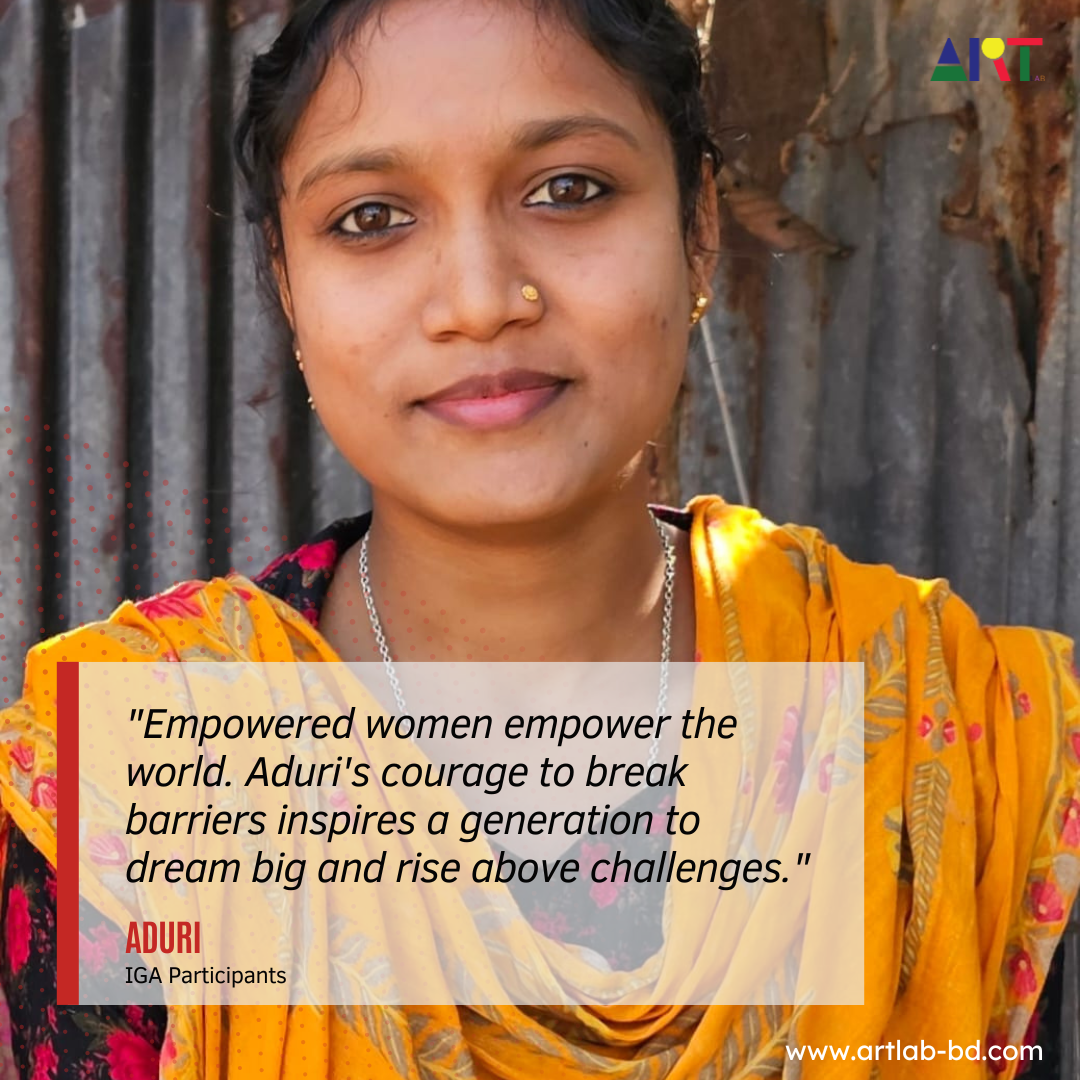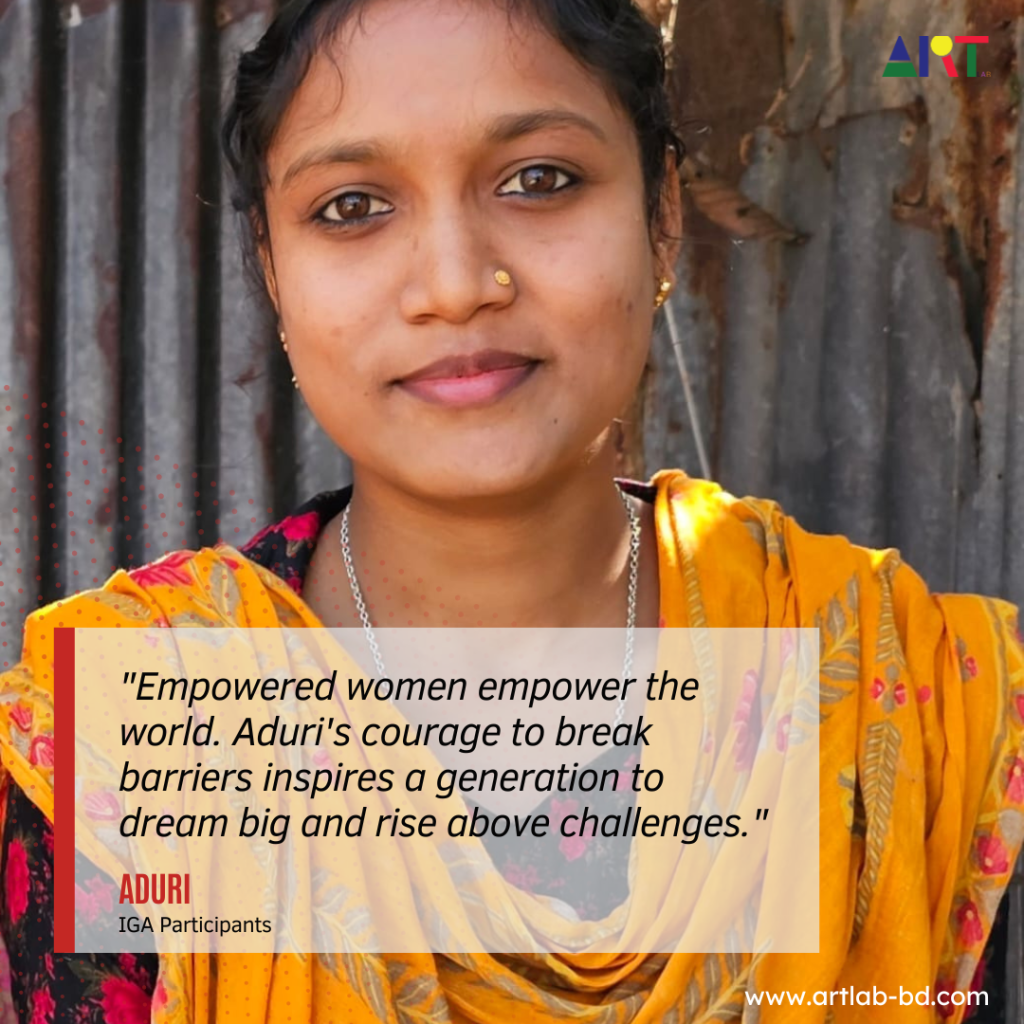

In a small, flood-prone village in Char Bajra, located in the Ulipur Upazila of Bangladesh, Aduri’s journey is a shining example of resilience, determination, and the power of education. Aduri, born in 2008, grew up in a family of three sisters, facing adversity from a young age. Her home, bordered by the river, was frequently affected by floods, forcing her family to relocate multiple times. Despite these challenges, Aduri’s potential for greatness became evident early on, as she consistently excelled in school, often securing the top spots in her class.
However, life in a marginalized rural community is not without its barriers. Aduri’s family, with limited resources and a dependence on her father’s agricultural labor, struggled to make ends meet. As a result, when Aduri reached the seventh grade, her parents, following a pattern seen in their own lives and community, began to consider early marriage for her. Like many girls in her village, she faced the societal expectation of being married off at a young age, a fate that had already befallen her elder sisters. This left Aduri torn between her dreams and the harsh realities of her circumstances.
A Turning Point: Joining the Adolescent Group
Despite the immense pressure from her family to follow the traditional path of early marriage, Aduri never lost sight of her passion for education. When an NGO called MJ SKS visited her village, they introduced a program that would change her life – the Adolescent Group. Initially shy and hesitant, Aduri attended the meetings where she was introduced to a range of issues, from the dangers of child marriage to the importance of gender equality and personal care. Although she started off quietly, simply observing, she quickly realized the immense potential these discussions held for her future and the future of other girls in her village.
As Aduri grew more involved with the group, her confidence blossomed. She learned to express her thoughts, began debating in competitions, and participated in various activities organized by the group, including football games where her team emerged victorious. These experiences not only boosted her confidence but also helped her develop a sense of agency.
The Power of Knowledge: Advocating for Change
With the support and training from the NGO, Aduri gained a new perspective on life. She started to understand the social issues affecting her community, such as child marriage, eve-teasing, and gender discrimination, and the impact of these issues on her future. She became passionate about spreading this awareness to others, including her own family. She began speaking to her parents about the importance of education and the dangers of early marriage. Slowly, her parents, who had previously been indifferent to her education, began to see the value in their daughter’s aspirations.
Aduri’s newfound voice not only changed her life but also inspired many around her. She eagerly shared her knowledge with fellow villagers, raising awareness on issues like gender equity and the importance of personal care, breaking through deep-rooted societal norms. Through the group, she started organizing awareness campaigns aimed at preventing child marriage, which ultimately led to her family reconsidering their previous stance on her marriage.
Overcoming Societal Constraints: A Dream for the Future
One of the greatest challenges Aduri faced was the societal restriction on girls leaving their homes, something that limited her freedom and ability to participate in many of the group’s activities. Initially, when the girls in the village began to play football and engage in public activities, there was significant resistance from the community. However, Aduri and her peers remained undeterred, gradually changing the community’s mindset. As the girls’ participation in these activities gained recognition, the village’s perception shifted from skepticism to pride, and the girls were celebrated as role models for others.
Aduri’s determination didn’t stop there. She continued to dream big, setting her sights on a future that few girls in her community dared to imagine. Her ultimate goal is to become an army officer, a role she envisions as not only serving her country but also inspiring other girls in her village to follow their dreams and challenge societal expectations.
A Legacy of Empowerment
Aduri’s journey is a testament to the profound impact that education, community support, and gender equality initiatives can have on individuals and entire communities. Through her involvement with the Adolescent Group, she gained the knowledge, confidence, and leadership skills that enabled her to break free from the traditional constraints placed on girls in her community.
Aduri is not only paving the way for her own future but is also setting an example for other young girls in her village. She dreams of creating a legacy that will inspire future generations of girls to be confident, independent, and to never give up on their dreams, no matter the obstacles they face.
Today, Aduri stands as a powerful symbol of resilience and empowerment. She is not just a young girl from a marginalized village—she is a beacon of hope, leading the charge for a more equitable and inclusive future. As she continues her studies and aspires to join the army, Aduri remains steadfast in her commitment to inspire others and break the barriers that still hold many girls back.
Conclusion
Aduri’s story is a compelling reminder of the transformative power of education, empowerment, and community support. By providing opportunities for young people, especially girls, to engage in educational and leadership initiatives, we can create ripple effects of positive change that will last for generations. Aduri’s journey not only highlights the challenges faced by girls in rural Bangladesh but also serves as a powerful call to action for us all to continue striving for a world where every girl has the opportunity to fulfill her potential.
As we reflect on Aduri’s accomplishments, let us also think about how we can contribute to breaking the barriers that hold others back. Every step toward empowering a young person is a step toward a more inclusive and just world.
Let’s continue supporting initiatives that uplift the voices of young girls and empower them to become leaders of tomorrow.

